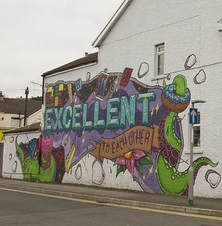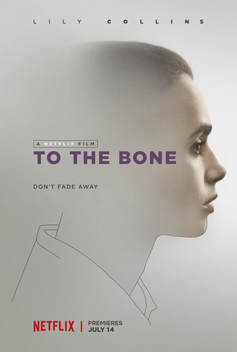 Image via Wikipedia Image via Wikipedia Disclaimer: I wrote these blogs a long time ago! I'm leaving them up as I don't want to delete my journey and I think showing growth is important. But it means that some of my views, and some language I use, is now different. Please be mindful of this, and that the content might be triggering, if you choose to read on. Content warning: eating disorders To The Bone is somehow listed as a 'comedy drama' on IMDB. It's certainly not a comedy. Writer/director Marti Noxon was apparently influenced by her own eating disorder experiences and wanted to help raise awareness of the illness. Whether it does this in the right way is up for debate, and I’m still not entirely sure myself. As much as I’ve had a very weird relationship with food and a rather negative relationship with my body in general, but I’ve not had anorexia so it’s not fair for me to question if the film portrays it well. Though of course it’s also subjective, so To The Bone may have been Noxon’s experience of anorexia but other people may have a very different reality of it. Writing about mental health is tricky, especially for films. From my own experience of learning to write screenplays, it’s all about the three act structure and there’s an expectation to resolve all issues in the final act. This might be something relatively easy to do in a blockbuster action film (there's usually just a big fight and then the guy gets the hot girl) but when there are characters with complex mental health issues it’s hard to realistically resolve these in such a short time. In real life, unpicking trauma can take years. This, for me, was where To The Bone went wrong. There was a lot of focus on the illness (which is always risky as it can end up being a "how to" of eating disorders) and the recovery seemed to be done by way of a rather strange, quite rushed, epiphany sequence. And of course there was a boy involved too…uh oh…. There are only two notable male characters in this film and they hardly speak to each other. Technically you could say it passes the Bechdel test with flying colours. The Bechdel test asks if two women talk to each other about something other than a man, and although this was originally a useful test, it doesn’t stop women being overruled by men in films. In To The Bone, both men talk to her like crap, and their behaviour is never justified as such. It’s a particular gripe of mine when women are saved by men in films, but especially when it involves a mental illness. Often there just is no cure, another reason why it’s so hard to make a film which tells these stories in a satisfying, believable, responsible way. My first screenplay was about a young woman with depression and anxiety, and I’ve spent so long working on the ending to find that balance of it being hopeful but realistic. There are many ways people cope with having a mental illness but meeting someone and falling in love is often not the solution. This only puts pressure on another person to have to ‘fix’ them. Strength comes from inside yourself, not from Prince Charming. This is obviously why I don't write romance! Lilly Collins, who plays Ellen in To The Bone, apparently had an eating disorder herself. It’s no surprise then that she was brilliant in the role, but she did lose weight for it. We can’t say this was a bad choice on her part, because she’s a grown women and is responsible for her own body, but there’s no denying it was a risky move which might have potentially triggered her ED (eating disorder) again. Whilst we’re on the topic of triggers, the film does have calorie counting, weight loss tricks, disordered eating etc, and there are triggering images. We can’t tell people with ED not to watch this film, it’s their choice and many of them will choose to because it’s relevant to them. As with 13 Reasons Why, all Netflix can do is make sure their audience is warned about the content, otherwise the responsibility lies with the audience. We also can’t say these kinds of films and TV shows shouldn’t be made, because otherwise how would we start a dialogue around them? If this film was banned, where would the line be drawn when it comes to other films? On the other hand, there are dangerous images of thin women everywhere. For someone to play an anorexic woman in a film, she needs to be noticeably thinner than other women in films, and the ‘normal’ level is pretty bloody thin. It’s not hard to find ‘thinspiration’ in this world. Some people with anorexia might want to be triggered. You only need to step into the world of ‘pro-ana’ (pro anorexia) websites and thinspiration (sometimes called ‘thinspo’, or even ‘bonespo’) to see that being triggered can be a good thing for them. Ultimately there might be a horrible irony to Lilly Collin’s choice to lose weight for the role in that she may become an unintentional thinspo idol. In short, maybe this film is made for people who don’t know very much about eating disorders. There could be many benefits to parents or teachers, for instance, watching this to help recognise some things that people with anorexia may do. In this sense of raising awareness, maybe it works. 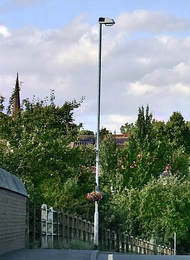 Look, it's Keanu Reeves. Look, it's Keanu Reeves. But let’s talk about Keanu Reeves. Keanu fucking Reeves. Personally, I think he has the screen presence of a lamppost. Apart from in the Bill and Ted films of course. (#NotAllKeanuReevesFilms) But maybe it’s not all his fault in To The Bone. It’s a mix of: a) the annoyingly privileged setting (they clearly got her into that residence ‘cos they’re loaded) b) patriarchal bullshit c) therapists always* being shit in films *Okay, so therapists in films are not all shit (#NotAllTherapists) but they need to be recognised in the script as being shit if they are. Take, for example, Robin Williams in Good Will Hunting. He’s not set up to automatically be the one we should trust because he’s working through his own issues. This works. What doesn’t work is when you get a weird, creepy therapist like Keanu Reeve’s character in To The Bone, who is treated like some kind of cult leader. His behaviour is then validated at the end when she returns to the house, and we’re supposed to believe that it’s a positive outcome for her. It’s great that she chooses to take steps towards her recovery, but to go back to a place run by such a weird creepy bloke is simply bonkers. Keanu/doctor/therapist/perv/cult leader is seen as radical because he says the word ‘fuck’ a few times. ‘Tell those negative thoughts to fuck off’ he says. So insightful and professional. Then he basically tells her to grow up and get over it, she goes away and has her little epiphany and then realises he’s right. The guy who thinks he can cure eating disorders by taking them to dance in some fake rain, is ‘right’ all along. She should’ve reported him, or at least gone to another clinic. But then, the boy was there. Prince Charming. The pompous British twat who came on to her but then instantly body shamed her when she said no. The one who tried to force-feed her chocolate. The one who sat on a tree branch in her epiphany dream – the bit where she was dressed up like some kind of born again Christian angel virgin and he made everything all better by telling her she was pretty. Couldn’t the stepsister have been sitting on that branch with her, Ellen wearing her usual clothes? Can she not take steps to recovery without there being a man there to help, and without having to wear less eyeliner? Then there was the mother and the moon. That strange, inappropriate feeding bit where her mother cradled her like a baby. I can see the theory behind that and it was nice to have a slight resolution to their seemingly turbulent relationship, but…really? And the moon…God knows. For a character who didn’t seem remotely spiritual, this ending was a little bit of a stretch for me. But the point is, she reaches the stage where she decides to follow the path to recovery. The intentions are good overall, and above all it’s a dialogue opener. The strength of the film was certainly in it’s strong female characters and family dynamic, showing how eating disorders effect the whole family. I hope this movie helps people learn a little more about an under-represented topic in film and will open conversations about eating disorders and how we can help people and families affected. If you or someone you know is affected by an eating disorder, here are some recommended websites: https://firststepsed.co.uk/firststepsed.co.uk/ https://www.b-eat.co.uk/ A note about triggering FEELING TRIGGERED IS NOT A WEAKNESS. If you’re the sort of person who mocks people for being triggered by things they watch or read, or uses the term ‘snowflakes’, you need to take a serious look at what kind of person you are. You wouldn’t laugh if that person was a relapsed drug addict, or if somebody had an injury which flared up. It proves how we don’t take mental health seriously enough as a society. Many people have had difficult experiences in their lives which can be easily triggered, bringing up difficult emotions. If you’re lucky enough not to have this problem then please recognise that not everyone is the same. It is not cool to laugh at somebody who is upset about something. It shows a lack of empathy, and that frankly you’re just a d*ck. Be excellent to each other!
0 Comments
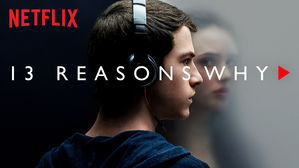 Photo - Netflix - https://www.netflix.com/title/80179249 Photo - Netflix - https://www.netflix.com/title/80179249 Disclaimer: I wrote these blogs a long time ago! I'm leaving them up as I don't want to delete my journey and I think showing growth is important. But it means that some of my views, and some language I use, is now different. Please be mindful of this, and that the content might be triggering, if you choose to read on. Trigger warning: rape, sexual assault and suicide. Contains season one spoilers. I just finished watching 13 Reasons Why on Netflix. Oh. My. God. We need to talk about this show. This is a really important series. It made me emotional. It made me cry. It made me feel down, but it was worth it. I was careful not to read anything about 13RW until I finished, so it was only then I discovered the backlash. I’d like to go through the negative comments and explain my take on them. Who am I? No expert, but I have a little insight. I work for a mental health organisation, am a screenwriter (a wannabe at least) and I was bullied at school (though it was before the days of social media so I guess I had it easy in comparison). Here are some of the negative responses I’ve come across so far: ‘Hannah is selfish and is overreacting’ If this is truly the way you think, please read up a little bit about depression and mental health issues. This is a very uncompassionate, selfish view to take, anchored in your own limited perspective. Where is your empathy? This view belittles her feelings and defeats the main points of the show. Hannah became so isolated that she felt nobody could help her and her life was empty. This was the result of the behaviour of people at school, but also because of bigger issues in our society of rape culture, gender inequality and sexism. 13RW is a statement on how mental health in teenagers, teenage girls in this case, isn’t taken seriously. If you think Hannah was selfish you might be the sort of person that thinks girls lie about rape or suicidal thoughts ‘for attention’, in which case you are part of the problem. Even if someone takes their own life ‘for attention’, they still made that choice so it’s almost irrelevant. It’s a cry for help, often too late. To think that girls are overly sensitive and emotional proves our social issue around kindness and empathy being weak traits. 'Helplines have got busier' “The Australian youth mental health service for 12–25 year-olds, Headspace, issued a warning in late April 2017 over the graphic content featured in the series due to the increased number of calls to the service following the show's release in the country.” - Wikipedia GOOD! If someone watches 13RW and makes a call to tell someone they were thinking about killing themselves, that’s one life that could be saved. If this show is making people speak out, how can that be a bad thing? ‘It never used the words mental health or depression’ Writers are told to ‘show and don’t tell’. 13RW relies on the audience to be able to recognise that Hannah’s mental health problems without the writers having to spell it out. Sometimes certain words can put people off if it seems like buzzwords or jargon. For instance, saying rape culture, feminism, heteronormative, might alienate some audience members. Feminism has a bad reputation (I don’t agree with that, I’m just sharing what I see all the time online). To make a TV show which demonstrates feminist issues instead of using words which might put people off is a powerful and influential way of telling a story. After all, if you’re going to raise awareness and change minds, you need to write in a way your audience can understand. ‘It glamorises suicide’ Oh, like Trainspotting glamorised heroin? I was teenager when that came out and the last thing it made me want to do was take heroin. In fact, it put me off taking drugs altogether. That had more of an impact than any anti-drugs talks at school. Often female suicide scenes in films are a little too beautiful, but Hannah’s death is realistic and painful, harsh and brutally permanent. Some schools in the US have sent emails to parents warning them about the show. Do adults know nothing about young people? I’m not even that young any more but it’s pretty obvious if you make a big deal out of something and tell kids not to watch something, they will find a way. That’s what I did with Trainspotting. Just accept that they’re going to watch it, and talk about it. ‘Hannah could’ve done more. Clay was there for her all along’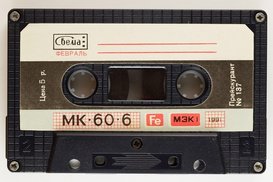 Hannah’s mental health problems got so severe that she didn’t have any energy to ask for any more help. People around her couldn’t recognize that there was a problem, much like many viewers of the show it seems. It’s sad that a lot of the events leading up to her death aren’t seen as anything unusual. This is how normal sexist behaviour has become. Hannah had a picture taken and shared without her consent, then put on the ‘hot list’, and then she was assaulted in public (when Bryce grabs her bum). I’m sure any girls would be familiar with these types of things, but it’s not normal. It’s not acceptable behaviour, and it should be passed off just because it happens a lot. That’s all the more reason to stop tolerating this kind of behaviour now. In terms of Clay, Hannah was not going to be saved by a love story. We have a major problem in our society with the ‘happy ending.’ The problem with most happy endings is that the heteronormative monogamous relationship, between two young people who stay married forever, is the epitome of perfect. We know it doesn’t always work exactly like that in real life, but we still hold it as the ideal. I bet a lot of viewers were hoping Hannah was just hiding somewhere, then Clay could save her and they’d run off into the sunset together. Happy endings give us unrealistic expectation of love, relationships, gender roles and happiness. Love does not equal happiness. How can a TV show which demonstrates the need to tackle rape culture and suicide be criticised more than the heteronormative, patriarchal rom-coms with thin, pretty women pandering to men? These films only add to the pressure on young people. Sometimes we have to watch something a little more challenging than a rom-com, otherwise we’ll never learn anything. ‘It says the other characters should blame themselves for Hannah’s death’ Many of the characters blame themselves but that’s part of their grieving process. I think the show is saying that schools can do better. That we – society - can do better. As Clay says, we all need to be kinder, not necessarily in a make-everyone-a-cup-of-tea sort of way (though wouldn’t that be nice) but rather try to understand why other people feel the way they do. Step into their shoes. This is compassion. There’s no harm in giving it a try. ‘There are too many high school tropes’ That's the point. Jocks, cheerleaders, nerds – as a screenwriter I’d be quick to point out stereotypical, overused characters in a high school drama. However, it was on purpose in 13RW to demonstrate how normalised their behaviour is. It holds a mirror up to society and shows us what we’ve become. The jocks rule the roost in American schools it seems, and we’ve got our equivalent in the UK. Everyone knows you need to at least try to be on the good side of the bullies or popular kids in order to survive school, which is why it’s hard to stand up to guys like Bryce. He’s the epitome of what our society sees as perfect masculinity – rich, white and powerful. Men like him grow up to be men like Donald Trump, and it’s clear there’s a lot of people who like him and his ‘locker room talk’. This has to change. ‘It's not realistic’ Despite the backlash, there are a lot of reviewers and people on social media saying how much the show had moved them and how they can relate to Hannah, I certainly can and it’s been quite a long time since I was at school! When Hannah said ‘but you’ve never been a girl’, it really stuck with me. 13RW is a harsh but true depiction of what can happen to young women growing up in a culture of objectification, toxic masculinity and rape culture. There are unfortunately too many Bryce’s in the world – rich white men, often athletes - protected because they’re at the top of the power food chain. ‘It's oversimplified – “be kind” doesn’t save lives’ True, but when Clay says ‘ we need to be kinder to each other’ I didn’t take that to mean ‘kindness can cure depression and stop people from killing themselves’ but that doesn’t mean it’s not true. People choose to take their own lives because of mental health issues, but there are factors in our society which are not helping. Rape culture ie normalised objectification, sexism, power over women, slut shaming, masculinity standards. We dismiss misogynistic behaviour as ‘boys will be boys’/’bro code’/’locker room talk’. We teach boys that being kind and compassion is weak, that they must hide their emotions and ‘man up.’ If you look at most of the terrorists and mass shooters in the world, not a lot of them are women. With the message that emotion and empathy equal weakness, it’s not hard to see why. Hannah is a demonstration of what could happen to girls growing up in a society of gender expectations and judgementalism. It’s a hard-hitting show because it has to be. People have been talking and writing about rape culture, consent and gender inequality for a long time but people weren’t listening. It’s taken a brutally harsh TV show to make the world sit up and take notice. 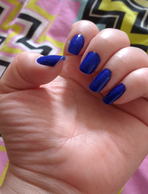 #bluenailsforhannah #bluenailsforhannah 13RW was hard to watch because it’s talking about the very things we want to pretend don’t exist. It forces us to notice. This is the power of storytelling. It has started a dialogue and might help chip away at the shame and stigma we’ve built up around such subjects. We need to listen to young people, many of them are loving the show. Instead of focussing on the suicide, focus on the reasons why – this is the point of the show after all. It makes no sense that everyone’s talking about the suicide, yet not about the gender inequalities which led to it. Instead of protecting people from seeing rape and suicide because it makes them feel uncomfortable, think about what we can do to address the issues which make girls like Hannah want to end their own lives. 13RW is a demonstration of the issues girls face simply for being female, and the expectation of boys to be more powerful, strong, and less emotional. For us to help, we need to not focus on protecting people from seeing suicide in a TV show, but rather break down gender rules and create a kinder, more balanced environment for everybody based on empathy and compassion. If you or someone you know is feeling low, take steps to find help. I work for a mental health organisation and many people tell me ‘I can’t call Samaritans, that’s just for when you want to kill yourself’ but that’s not true. Don’t wait until it gets to crisis point. Everyone needs to ask for help in their lives. We need to be kind and have compassion for others, but for ourselves too. Samaritans: phone 116 123 Recommended further reading - a brilliant article about gender equality by Natalie Bennett, one of the founders of TIGER Bristol. |
Categories
All
Archives
June 2024
|
